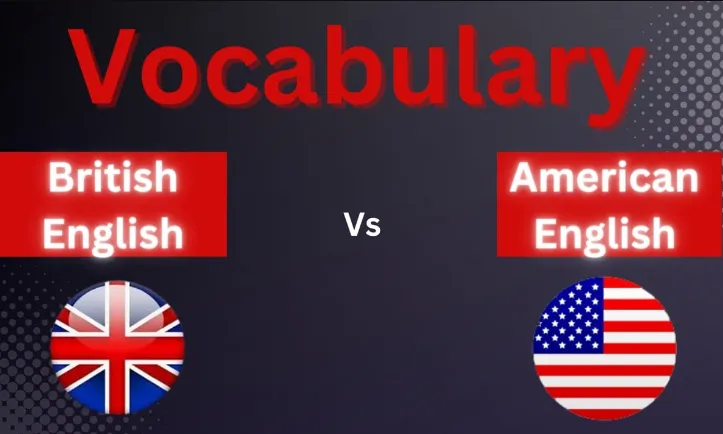British vs. American English Vocabulary

The English language, spoken by millions across the globe, has evolved into several distinct forms. Two of the most prominent versions are British English and American English. Though fundamentally the same language, these variations have differences that can sometimes lead to misunderstandings or confusion. Here, we will explore key distinctions in vocabulary between British and American English.
Contents
Vocabulary Differences
Everyday Objects
- Apartment (US) vs. Flat (UK)
- In the United States, the term “apartment” is used to describe a set of rooms forming an individual residence within a building. In the United Kingdom, the equivalent term is “flat.”
- Elevator (US) vs. Lift (UK)
- Americans refer to the mechanical device that transports people between floors of a building as an “elevator.” In British English, it is called a “lift.”
- Truck (US) vs. Lorry (UK)
- The vehicle designed to transport goods is known as a “truck” in American English and a “lorry” in British English.
Food and Drink
- Cookies (US) vs. Biscuits (UK)
- What Americans call “cookies,” the British refer to as “biscuits.” However, in the UK, “biscuits” are typically sweet, whereas American “biscuits” are more like savory bread rolls.
- Fries (US) vs. Chips (UK)
- In the US, thinly sliced, deep-fried potatoes are called “fries.” In the UK, they are known as “chips.” Confusingly, “chips” in the US refer to what the British call “crisps.”
- Candy (US) vs. Sweets (UK)
- The general term for confections in the US is “candy,” while in the UK, these are commonly referred to as “sweets.”
Clothing
- Sweater (US) vs. Jumper (UK)
- The knitted garment worn on the upper body for warmth is called a “sweater” in American English and a “jumper” in British English.
- Pants (US) vs. Trousers (UK)
- Americans use the term “pants” to describe what the British call “trousers.” In the UK, “pants” refer to undergarments.
- Sneakers (US) vs. Trainers (UK)
- Athletic shoes are known as “sneakers” in the United States and “trainers” in the United Kingdom.
Transportation
- Subway (US) vs. Underground (UK)
- The rapid transit system that runs beneath cities is referred to as the “subway” in the US and the “underground” or “tube” in the UK.
- Freeway/Highway (US) vs. Motorway (UK)
- Major roads designed for fast traffic are called “freeways” or “highways” in America, whereas in Britain, they are known as “motorways.”
- Gasoline (US) vs. Petrol (UK)
- The fuel used in cars is called “gasoline” or “gas” in the United States, but “petrol” in the United Kingdom.
Learning and Education
- School (US) vs. School/College/University (UK)
- In the US, “school” can refer to any level of education, from elementary to college. In the UK, “school” typically refers to primary and secondary education, while “college” and “university” refer to higher education institutions.
- Grades (US) vs. Marks (UK)
- In the US, students receive “grades” for their academic performance, whereas in the UK, they receive “marks.”
- Principal (US) vs. Headteacher (UK)
- The head of a school is called the “principal” in American English and the “headteacher” or simply “head” in British English.
Influence of Media and Globalization
The widespread consumption of media from both the United States and the United Kingdom has led to a blending of vocabularies in many parts of the world. For example, American movies, television shows, and music have popularized American English terms globally, while British literature and media continue to influence language use in many countries.
Learning British vs. American English
For learners of English, understanding these differences is crucial. Here are some tips:
- Exposure to Both Variants:
- Consume media from both the US and the UK to become familiar with the vocabulary used in each variant.
- Practice and Context:
- Use the terms in context to get used to when and where they are appropriate. For example, knowing that “pants” means different things in the US and UK can prevent embarrassing misunderstandings.
- Interactive Learning:
- Engage in conversations with native speakers from both countries, if possible, to gain firsthand experience in using the vocabulary correctly.
- Educational Resources:
- Use dictionaries and online resources that highlight the differences between British and American English. Some educational platforms offer specific courses focusing on these differences.
Understanding and appreciating the variations in British and American English can enrich one’s command of the language and facilitate smoother communication across different English-speaking regions. Whether you’re traveling, studying, or engaging in international business, being aware of these distinctions can greatly enhance your language skills.


